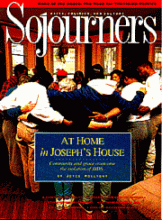Reading most of the Jacques Ellul books that weigh down my bookshelves is a major achievement. Mastering Ellul's thought is no mean feat either, as he has written 50 books and more than 1,500 articles.
There are presently available two fine examples of his work. Both are slim, readily comprehensible, and absolutely essential to Ellul's thought. These are Ellul at his best. Summarizing many of his important themes, these books serve as an excellent introduction to Ellul.
In Anarchy and Christianity, Ellul delves into a topic that he has alluded to elsewhere and occasionally written about in essays. Addressing both anarchists and Christians, he confronts the largely unchallenged beliefs that Christianity is inherently hostile to anarchism or that anarchism is inevitably opposed to Christian faith.
Ellul rejects the stereotypes of anarchism. Anarchy is not disorder but the absence of authority and dominion. Anarchy is a rejection of violence, a conscientious objection, "not merely to military service but to all the demands and obligations imposed by our society: to taxes, to vaccination, to compulsory schooling, etc." He particularly endorses "marginal actions which repudiate authority" and recommends creating "new institutions from the grass-roots level."
While challenging the idea that Christianity is inevitably hostile to anarchism, he is not trying to persuade anyone to embrace anarchism. He just does not want it ruled out too easily. As political options go, anarchism is "in keeping with the biblical Word" and "closest to biblical thinking."
Read the Full Article

